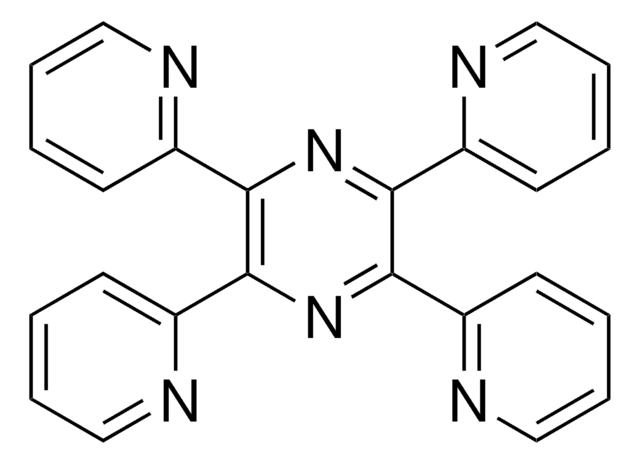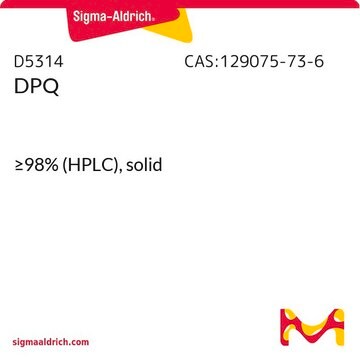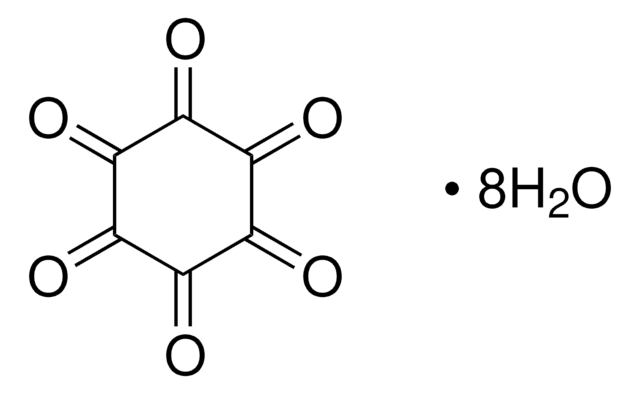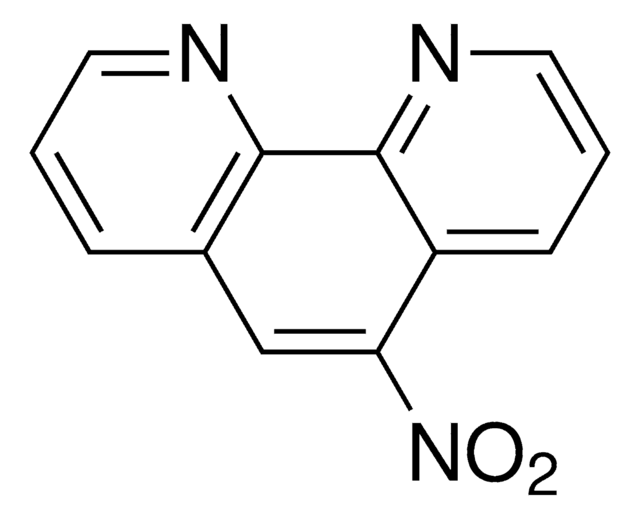All Photos(1)
About This Item
Empirical Formula (Hill Notation):
C14H8N4
CAS Number:
Molecular Weight:
232.24
MDL number:
UNSPSC Code:
12352103
PubChem Substance ID:
NACRES:
NA.23
Recommended Products
Assay
99% (HPLC)
form
solid
mp
310-315 °C
SMILES string
c1cnc2c(c1)c3nccnc3c4cccnc24
InChI
1S/C14H8N4/c1-3-9-11(15-5-1)12-10(4-2-6-16-12)14-13(9)17-7-8-18-14/h1-8H
InChI key
IBOSPAWVGHGUAV-UHFFFAOYSA-N
General description
Pyrazino[2,3-f][1,10]phenanthroline is a ligand which is used in the synthesis of copper(I)- phenanthroline complexes which are used in molecular device technology and in solar-energy conversion. It functions as an electron acceptor and the electron density is delocalized on the quinoxaline ring. The absorption and emission properties and the excited state lifetimes of these phenanthroline based copper complexes can be fine-tuned easily.
Application
- As an electron accepting ligand in metal complexes which are used in solar cells.
- Used in the synthesis of ruthenium (II) complexes which are used as DNA probes.
Features and Benefits
Imparts improved directionality of electron transfer in excited copper complexes.
Certificates of Analysis (COA)
Search for Certificates of Analysis (COA) by entering the products Lot/Batch Number. Lot and Batch Numbers can be found on a product’s label following the words ‘Lot’ or ‘Batch’.
Already Own This Product?
Find documentation for the products that you have recently purchased in the Document Library.
Customers Also Viewed
Synthesis, spectroscopic and electrochemical characterization of copper (I) complexes with functionalized pyrazino [2, 3-f]-1, 10-phenanthroline.
Barrientos, L., Araneda, C., Loeb, B., & Crivelli, I. G.
Polyhedron, 27(4), 1287-1295 (2008)
Yujie Sun et al.
Inorganic chemistry, 47(14), 6427-6434 (2008-06-25)
A series of ruthenium(II) complexes possessing ligands with an extended pi system were synthesized and characterized. The complexes are derived from [Ru(bpy)3](2+) (1, bpy = 2,2'-bipyridine) and include [Ru(bpy)2(tpphz)](2+) (2, tpphz = tetrapyrido[3,2-a:2',3'-c:3'',2''-h:2''',3'''-j]phenazine), [Ru(bpy)2(dppx)](2+) (3, dppx = 7,8-dimethyldipyrido[3,2-a:2',3'-c]phenazine), [Ru(bpy)2(dppm2)](2+) (4
Ge; Hu; Wei;et al.
Journal of Luminescence, 131, 238-243 (2011)
Our team of scientists has experience in all areas of research including Life Science, Material Science, Chemical Synthesis, Chromatography, Analytical and many others.
Contact Technical Service




![Dipyrazino[2,3-f:2′,3′-h]quinoxaline-2,3,6,7,10,11-hexacarbonitrile 95% (HPLC)](/deepweb/assets/sigmaaldrich/product/structures/151/558/c0e2c95f-5228-4864-a7a5-4b9765a19840/640/c0e2c95f-5228-4864-a7a5-4b9765a19840.png)









